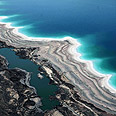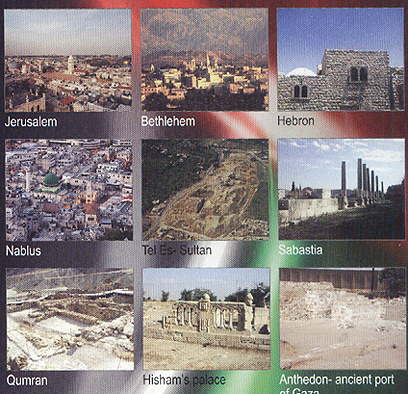
Dead Sea
צילום: AFP
PA to submit Israeli sites to World Heritage List
Palestinians trying to tighten grip in international arena, submit list of locations, including Dead Sea, Qumran Caves to be declared World Heritage Sites by UNESCO
Failure to make progress during the latest round of talks between the Palestinians and Israel led the Palestinian leadership to examine new ways in which to gain recognition in the international arena.
One such effort is focused on submitting nominations of heritage sites – both on Palestinian and Israeli territory – for inscription on UNESCO's World Heritage List.
Relates stories:
- Palestinians to push heritage agenda at UNESCO
- PA step closer to UNESCO membership
- PA rewriting Jewish history
The Palestinian Authority was admitted as a full member of UNESCO in October 2011, which enables it to make bids for historic monuments and locations to be classified as World Heritage Sites.

Heritage sites according to the Palestinians
The list of sites submitted to the organization includes the Church of the Nativity in Bethlehem, the Old City of Nablus, Sebastiya, the ancient port of Gaza, Hisham's Palace and Tel al Sultan in Jericho, Mount Grizim, the monasteries in Judea Dessert and Rehan Forest.
In addition, the Palestinians considered adding Jerusalem to the list, but Jordan beat them to the punch, and east Jerusalem has already been declared as a World Heritage Site.
Along with the list of sites under the PA's control, the Palestinians are also considering submitting heritage sites that are under Israeli control such as Qumran Caves and the Dead Sea.
Officials in Ramallah told Ynet they see nothing wrong with the PA proposing to recognize these sites on behalf of Palestine
"It's very simple – according to the international law, the entire West Bank is occupied territory and therefore all of the countries who recognize a Palestinian state within the 1967 borders will support this."
The officials noted that aside from the political issue, the Palestinians have the right to defend their historical and cultural sites from Israel. According to them, the list of suggested heritage sites has already been submitted to UNESCO.
UNESCO has had an office in Ramallah since 1998. According to their protocol, the sites on the list will not be examined by the organization prior to 2014, however the PA can ask for an emergency debate if these sites face natural disasters or immediate risk.
- Receive Ynetnews updates directly to your desktop










